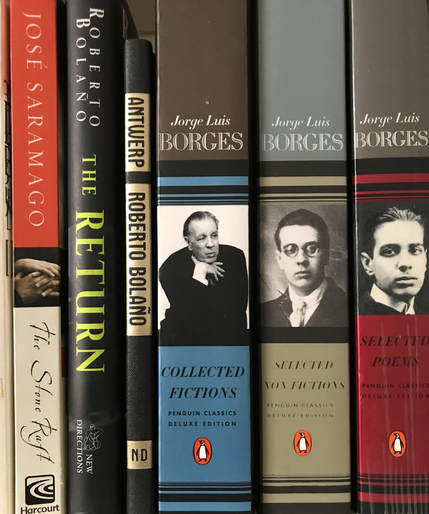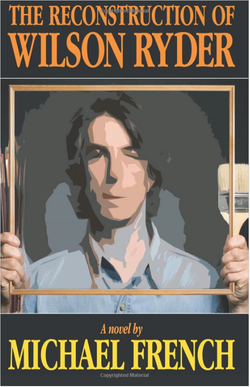BOOK
|
|
Reading is the ultimate inspiration! A Corner of Our Bookcase “We never stop reading, although every book comes to an end, just as we never stop living,although death is certain.” Roberto Bolano “As citizens, we all have an obligation to intervene and become involved -
it's the citizen who changes things.” Jose Saramago
0 Comments
Guest Post by Santa Fe author, Michael French  There may be a thousand and one books on how to write a novel, filled with sound observations, but when it comes to creating and developing characters, many emphasize the mechanical over the intuitive. Over decades, here’s what I’ve painstakingly learned about making your characters authentic, original and memorable. 1. Most writers begin the writing process by working on plot. While plot is obviously important, I also like to know everything possible about my main characters, even if I never use many of their details in the novels. Whether you take voluminous notes about them, or talk out loud to them (and they talk back to you), it’s rarely enough. You need to imagine what they would do off the page, i.e., if they had to attend your Uncle George’s July fourth barbecue, or somehow landed in another novel altogether. Make them your best friends or worst enemies. Whether they come from your imagination or real life (or a combination thereof), you should be inside your characters a few hours every day—before you write a single word. Think of method acting. Characters aren’t simply pawns in a plot—they transcend it. They are what you remember long after the plot is often forgotten. 2. Great characters, to enhance their arc, should have a fourth or fifth gear that seems to come out of nowhere. For example, villains can turn into heroes with an act of kindness that we would never have anticipated, yet when we read the novel closely, we realize that the seed of kindness was planted by the writer from the beginning. Similarly, characters we start off admiring suddenly disappoint us when they hurt someone they love. If they don’t realize what they’ve done, figuring out the “why” makes them even more interesting. Well-conceived characters can help with plot troubles, too, if the writer wakes one morning and isn’t sure where his or her story is going (happens to most of us). Instead of robbing a bank, for example, your destitute character decides to give away his last fifty dollars to a stranger. The wife who has been cheated on, instead of taking revenge on her husband, is filled with insights about her father. A deeply-felt, richly-imagined character is your writing buddy, your co-conspirator, and their importance to the final product can’t be overstated. 3. It’s great to surprise a reader with the unexpected, helping give a twist to the plot and the character, but whatever transpires, it must have credibility. Unless she’s a prodigy, a twelve year old girl is not going to solve the murder of her parents that happened ten years earlier. A surgeon who graduated from Harvard is not likely to leave a sponge behind in his patient’s abdomen. If you go for low probability events, or extreme twists, you have to back them up with plausible explanations. The “willing suspension of disbelief” only goes so far. Once a reader becomes skeptical that the writer doesn’t know what he or she is talking about, it’s tough to win them back. 4. Most writers are more comfortable delineating one sex (or gender) over another, which often dictates their main characters and the genre a writer chooses. You can still be a male and write fantasy romances, or a female skilled at describing war scenes, but whatever your strength, play to it. Very few writers do everything well. The best write about what they know, and their characters evoke passion, empathy or curiosity in a reader. 5. Building a character arc should be done over the span of the novel. Just like it’s a writing sin to have an information plot dump in the first chapter of your book, likewise your characters shouldn’t reveal themselves right away. One aspect at a time—brought out by action rather than exposition—keeps the reader engaged. 6. Try to have one of your characters do or say something in the course of the narrative that’s totally original…something that’s never been done in another movie or film. This is not easy to achieve, but if you have an imagination, have some fun with it. You’ll go down a lot of dead ends, but if you’re lucky, you’ll end up on a mountain peak. Remember that the event has to be plausible, but originality is usually memorable. No matter how many crime stories we read, for example, the great ones take our thoughts and emotions to unexplored places. It’s what readers talk about in reviews and blogs. 7. All good writing, whether its plot, theme or characters, involves a high degree of problem solving. You start your novel after doing the prep work described above, yet as the words march across the page, something feels a little off. You can’t put your finger on it. What have you forgotten or overlooked? Where is the spontaneity and energy? The pieces fit beautifully when your first imagined them, but suddenly they’re like reading a foreign language. Take a break. Do something else with your life that week, or work on a different part or aspect of the novel. Ultimately, the biggest problem, when you finally solve it, can becomes your best writing. My Latest Novels
Guest Post by Marty Gerber - Terra Nova Books Editor Bookends is a New York Times column in which two writers go mano a manoover a book-related issue chosen by editors to put them at opposite ends of the widest possible spectrum. One such recent spectrum was book subjects that are "underrepresented in contemporary fiction." (Though the question “Compared with what?” was ignored, I think the intended answer would be the world we breathe and bleed and breed in.) For Ayana Mathis, joy was on top of the “missing” list. Today's writers, she said, have dived into a sea of "despair, alienation, and bleakness." And she sees the reason clearly—a need to "write against" our culture's most common images of how people live: those created by ad writers and political speech-makers. As a result, Mathis says, "We have elevated suffering to the highest of virtues." However, the counterpointing Siddhartha Deb awards writers more personal responsibility for what they ignore: refugees drowning at sea, life in solitary confinement, endless doomed struggles to merely pay the rent. "Literary fiction," he says, "seems cut off from . . . the very substance of living." And the cause that he sees goes deeper than Mathis's view; it is "the narrowing of sensibilities and interests of those writing today." I realize there's a theory that "literary fiction" is impervious to the marketplace, that its creators should somehow be able to buy gas and pay the babysitter with specie consisting of the good, the true, and the beautiful. This is fantasy, of course. Reality is that those allowed by idealism or trust fund to avoid considering what people might want to read—the "demand" part of the capitalist equation—are pretty few on the supply side of the writing world. The large majority might wish they had that luxury but know they’re sadly stuck with the need to at least occasionally consider their audience. Deb holds out Elena Ferrante, a writer focused on "unpalatable truth," as someone who "might free herself from the tired pursuit of fiction as a matter of professional advancement" and replace it with "indifference to what the market wants." He probably regrets that she's shown no interest in having her novels go unread. As a fallback, my best suggestion is that Deb, an author praised for both his fiction and non-fiction, step forth himself into that land where writers answer only to themselves. "The rot of today’s literary scene," he laments, is "reinforced by the corporate demands of mainstream publishing houses"—clearly unacceptable for any person of honor. It's only a matter of time, I'm sure, before Deb will be bravely putting his keyboard fingers where his mouth is—except, that is, for the middle one proudly reserved for his readers. |
Subscribe!
Book Santa FeFor the love of books! Archives
October 2019
Categories
All
|
|
Copyright 2018 by Artotems Co.
|
Site by Artotems Co.





 RSS Feed
RSS Feed